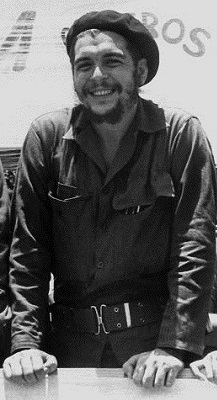|
~ Ernesto Che Guevara
~ Galéria
~ Oldal
~ Bejelentkezés
~ Vissza a Főoldalra
Ernesto Che Guevara, az argentin származású forradalmár, miniszter, gerillavezér és író, Buenos Aires-ben szerzett orvosi diplomát, majd a kubai forradalom során jelentős szerepet játszott a szigetország felszabadításában és újjáépítésében. A kubai gazdaság talpraállításáért dolgozott, küzdött az oktatás és az egészségügy fejlesztéséért, az írástudatlanság és a faji előítéletek felszámolásáért. Saját példájával népszerűsítette az önkéntes munkát. Kongóban és Bolíviában is harcolt - harminckilenc éves volt, amikor az amerikai-bolíviai csapatok csapdába ejtették és kivégezték.
| | |
|

| | |
|
|
|
"In Cuba we were treated as VIP for being the members of Che's family"
|
|
|
"We arrived in Havana, Cuba, on my father's 30th birthday... It seemed that we were important people, to those who took care of the machine guns." - this is how Martin Guevara started the story of those twelve years that he spent in Cuba in his memoir, A la sombra de un mito.
Martin Guevara was ten years old when he knew that he was the nephew of Ernesto Che Guevara, the revolutionary, who chose to die standing than living on his knees and about whom he was told when he arrived in Havana in 1973 that he [Che] had fought for equality.
The boy, who just arrived from Argentina, could see Che's portrait everywhere on the Cuban streets, tickets and coins, and he imagined his uncle as one of the characters of Emilio Salgari whom he admired so much: "I felt a very strong pride because it was like discovering a Sandokan or a Tarzan in the family and I was devastated when I heard that he was dead."
Little by little the myth became heavy and doubts arose: "It was a contradiction that we were treated like VIP for being the family members of the man who fought for equality and justice for everyone, while there were people living in deprivation and restrictions.
In his book, he wrote about his life in Cuba, under the myth of Che. "At school every day in the morning we said: Pioneers for communism, we will be like Che!"
When he was growing older, he tried to find out the truth behind the myth whether Che was really so brave, fearless, intelligent and intellectual as it was told. And because it was impossible to compete with the myth, he [Martin Guevara] became an antihero. He had to leave Cuba and returned to Argentina, then he moved to Spain in 1997 and he has lived there since then, working for a logistical company.
He speaks about Che with great respect, but he doesn't stop talking about the double standard of the Cuban Revolution, of the macho and authoritarian society.
He read Lenin and Trotsky, when he started to reflect on the reasons that had led his uncle to be a revolutionary, who discovered "the perversion of power and ability to transform people".
"Everyone started with good intentions, but in the end the power converted them into something they had fought against, and they executed and prohibited.... When he [Che] saw that he was just going to have to make such desicions, he continued his way of the revolutionary in the guerilla - and not of the minister. His tragic destiny [he was executed in Bolivia in 1967] has to be looked at with the defiance of personal shame, of his exposed body. He was one of the few people who was consistent of risking his life for something he was fighting for. When he died, he weighed half of that he had weighed before leaving for Bolivia, after starving so often.
For Martin Guevara the book was a reconciliation. "It was a therapy." He feels himself very far from the violent guerrilla fighter, but he admires his uncle's "consistency and loyalty that are missing from our lives today. Latin America owes him [Che] all the dignity it has today."
Source
|
|
|


| | |
|
|
|
~ Ernesto Che Guevara
~ Gallery
~ Site
~ Log in
~ Back to the Main page
Ernesto Che Guevara, the Argentine-born revolutionary, minister, guerrilla leader and writer, received his medical degree in Buenos Aires, then played an essential part in the Cuban Revolution in liberating and rebuilding the country. He did his best to set up the Cuban economy, fought for the improvement of the education and the health system, the elimination of illiteracy and racial prejudice. He promoted voluntary work by his own example. He fought in the Congo and in Bolivia - he was thirty-nine years old, when he was trapped and executed by the joint American-Bolivian forces.
| | |
|
|

